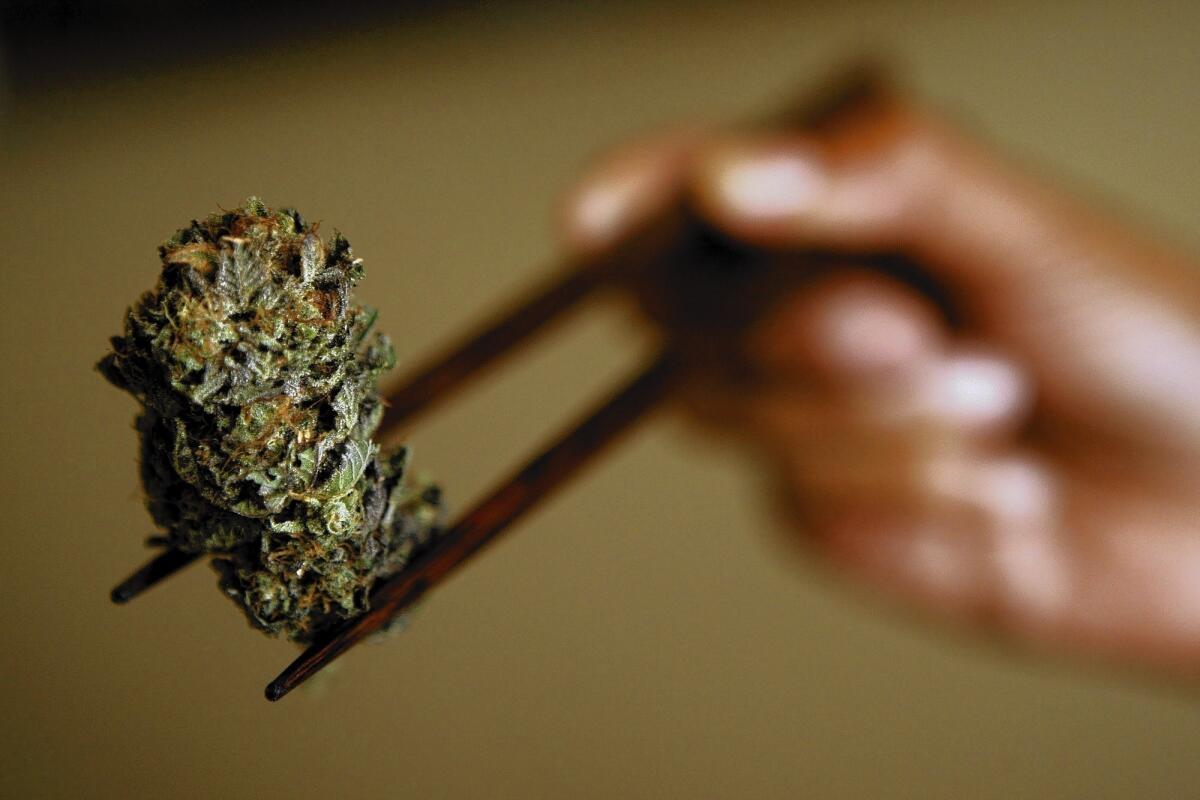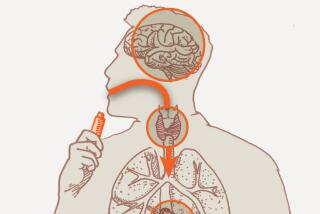As marijuana laws change, health risks of pot use are weighed

- Share via
Now that people in Colorado (and, soon, Washington state) can buy marijuana about as easily as they can pick up a 12-pack of Bud Light, it’s a good time to ask: How risky is it to turn to pot?
President Obama has already shared his opinion, telling the New Yorker magazine, “I don’t think [marijuana] is more dangerous than alcohol.” The president’s opinion stands in stark contrast with official federal policy that still classifies marijuana as a Schedule 1 drug, putting it in the same class as heroin and LSD.
In this case, the president seems to be more correct than the government, says Richard Miller, professor of pharmacology at Northwestern University Feinberg School of Medicine in Chicago. “No question about it,” Miller says. “It’s absolutely clear that marijuana is much less dangerous than alcohol.”
According to Miller, marijuana is the safer choice whether you’re using it for a single night or a lifetime. “When people drink alcohol, they often get out of control and get violent. They crash their cars and beat their wives. But when people smoke marijuana, they get very relaxed and mellow.”
Roughly 10% of people who try marijuana will eventually run into trouble, says Dr. Christian Hopfer, associate professor of psychiatry at the University of Colorado School of Medicine in Aurora. That’s about the same odds that a drinker will abuse alcohol, he says, but there’s a big difference: Alcoholism causes far more physical and emotional devastation.
The signs of marijuana addiction are subtle, he says. Adults who smoke heavily — as in four or five time a day, every day — tend to have trouble learning, remembering and dealing with complicated tasks. “They’re definitely impaired,” Hopfer says. “They organize their lives around using.”
Fortunately, the habit is breakable. “A lot of people who use marijuana heavily in their 20s eventually quit on their own,” he says. “It’s probably easier than stopping [tobacco] smoking.”
The toll seems to be worse for young brains. According to Hopfer, adolescents who smoke a lot of marijuana can expect to lose about 8 points from their IQ. Young users also seem to be more likely to become psychotic in later years, although the risk is still small. “About one user in a thousand will end up with a psychotic illness that they wouldn’t have had otherwise,” he says.
As reported in November in Current Psychiatric Reports, marijuana can threaten physical health too, although the dangers appear to be mostly small and unpredictable. After summing up studies over the last 15 years, researchers at the U.S. Department of Veterans Affairs found evidence linking marijuana to lung disease, heart disease and other ailments, but the actual risks were hard to pin down. For example, one study suggested that smoking a single joint increases the odds of a heart attack within the next hour, but other studies have failed to find any sign that marijuana users are more likely than non-users to suffer a heart attack over the long term.
The report also noted some growing but inconclusive evidence that long-term marijuana use could increase the risk of cancer in the lungs, bladder, head and neck. The authors noted, however, that marijuana doesn’t seem to be in the same league as tobacco when it comes to the potential to cause cancer — another comparison that was practically guaranteed to cast marijuana in a positive light.
A 2013 study published in the Journal of General Internal Medicine suggests that even heavy marijuana users aren’t necessarily a sickly bunch. The study looked at nearly 600 primary-care patients who had tested positive for marijuana or another illicit drug. Chronic marijuana smokers were just as healthy as occasional smokers and weren’t any more likely to have had a recent stint in the ER or a hospital bed.
The president’s pot analysis may have been accurate, but it wasn’t necessarily helpful, says Dr. Timothy Naimi, an associate professor of medicine and community health sciences at Boston University School of Medicine.
“Saying marijuana’s safer than alcohol sets an incredibly low bar,” Naimi says, adding that alcohol kills about 80,000 people a year. “Marijuana can still be a dangerous substance.”
While the risks of marijuana may be relatively small for each individual user, Naimi believes problems are likely to grow with access to the drug. “It’s five times more potent than the pot I grew up with. We’ve lowered the price and increased the supply. I’m not for or against legalization, but those are red flags.”
Supporters of legalization often say marijuana should be as freely available as beer or whiskey. But Naimi says the nation’s experience with alcohol isn’t exactly a ringing endorsement of lax regulations and easy access to mind-altering substances. Instead, he says, the toll of alcohol should “give pause” to anyone hoping to bring marijuana to the masses.
ALSO:
Unraveling any weight-gain links to stress, cortisol
Exercise boost — keys to keeping with the program
Step by step, a way to health, happiness and friendship
More to Read
Sign up for Essential California
The most important California stories and recommendations in your inbox every morning.
You may occasionally receive promotional content from the Los Angeles Times.













